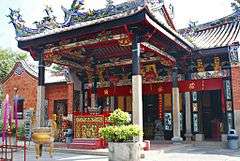Religion in Malaysia
Malaysia is a multicultural and multiconfessional country. As of the 2010 Population and Housing Census, 61.3 percent of the population practices Islam; 19.8 percent Buddhism; 9.2 percent Christianity; 6.3 percent Hinduism; and 1.3 percent traditional Chinese religions. The remainder is accounted for by other faiths, including Animism, Folk religion, Sikhism and other belief systems.[1] Numbers of self-described atheists in Malaysia are few; the state has come under criticism from human rights organisations for its discrimination against atheists.[2]
Islam in Malaysia is represented by the Shafi'i version of Sunni theology and jurisprudence.[3][4] Islam was introduced by traders arriving from Arabia, China and India. It became firmly established in the 15th century. The constitution makes Malaysia a secular country and guarantees freedom of religion, while establishing Islam as the "religion of the Federation" to symbolize its importance to Malaysian society.[3][4] The king is generally seen as the defender of the faith in the country and members of the royal family may lose certain privileges if they leave Islam and convert to another religion.
Malaysian Chinese practices various faiths: Mahayana Buddhism and the Chinese traditional religion (including Taoism). Hinduism is practised by the majority of Malaysian Indians. Christianity has established itself in some communities, especially in East Malaysia. It is not tied to any specific ethnic group. Other religions, such as the Baha'i Faith and Sikhism also have adherents in Malaysia.
Relations between different religious groups are generally quite tolerant. Christmas, Chinese New Year, and Deepavali have been declared national holidays alongside Islamic holidays such as Muhammad's birthday etc. Various groups have been set up to try to promote religious understanding among the different groups, with religious harmony seen as a priority by Malaysian politicians.
Religious distribution
Religion in Malaysia (2010)
All the world's major religions have substantial representation in Malaysia.[5] The Population and Housing Censuses figures shows approximately these proportions of the population following these religions:[6]
| Year | Islam | Buddhism | Christianity | Hinduism | Confucianism, Taoism and other traditional Chinese folk religion | No religion | Other religions or no information |
|---|---|---|---|---|---|---|---|
| 2000 | 60.4% | 19.2% | 9.1% | 6.3% | 2.6% | 2.4% | |
| 2010 | 61.3% | 19.8% | 9.2% | 6.3% | 1.3% | 0.7% | 0.5% |
All the Malaysian Malay people are Muslim by law. Most Malaysian Chinese follow Mahayana Buddhism or Chinese traditional religions (including Taoism, Confucianism, ancestor-worship or newer sects).[5] Statistics from the 2010 Census indicate that 83.6% of Malaysia's ethnic Chinese identify as Buddhist, with significant numbers of adherents following Taoism (3.4%) and Christianity (11.1%).[6] Actually, the percentage of practitioners of the Chinese folk religions may be higher, as many practise both Buddhism and folk religions.
Christianity is the predominant religion of the non-Malay Bumiputra community (46.5%) with an additional 40.4% identifying as Muslims.[6] Many indigenous tribes of East Malaysia have converted to Christianity, although Christianity has made fewer inroads into Peninsular Malaysia.[5]
Law and politics
Although Malaysia is a multi-religious society, and the Malaysian constitution theoretically guarantees freedom of religion, Islam is the official religion of the federation, as well as the legally-presumed faith of all ethnic Malays. No ethnic Malay is allowed to leave Islam, while non-Malay Muslims seeking to apostacise require permission from a sharia court, which is rarely granted.[7] Religious beliefs follow ethnic lines.[8] Holidays have been declared for holy days in numerous religions,[7] although only Islam has more than one national holiday.[8] Whether a religion obtains approval of the government is determined by the Registrar of Societies, part of the Ministry of Home Affairs. Only upon approval do they qualify for government benefits. However, unrecognised groups such as the Falun Gong can practise by registering themselves under the Companies Act, although this means that technical violations of the act can result in a fine.[7]
The government believes the constitution provides a strong enough guarantee of religious freedom and should not be changed. Some restrictions are made on Malay texts from non Islamic religions in Peninsula Malaysia, however there are much less restrictions in East Malaysia. Headscarves are mandatory for non-Muslims in certain situations.[7] The MyKad identity card states whether the holder is a Muslim or not.[8]
As Islam is the state religion, the government provides financial support to Islamic establishments and enforces the Sunni form of Islam. State governments can impose Islamic law on Muslims, and the government will offer grants to private Muslim schools that allow a government-approved curriculum and supervision. The government also indirectly funds non-Islamic communities, although to a much smaller degree. The government generally does not interfere with the religious practices of non-Muslim communities. Public schools offer an Islamic religious instruction course which is compulsory for Muslim students, and non-Muslim students take a morals and ethics course.[7]
The government prohibits any publications that it feels will incite racial or religious disharmony,[7] and has asked that religious matters not be discussed in public due to their sensitivity.[9] It claims nobody has been arrested under the Internal Security Act for religious reasons. The government may demolish unregistered religious places of worship, and nongovernmental organisations have complained about the demolition of unregistered Hindu temples. These were often constructed on privately owned plantations prior to independence in 1957. After independence plantations became government property. In 2006 the state of Negeri Sembilan announced the demolition of a Hindu temple, although the temple sought injunction and took it to court.[7] State governments control mosques, appoint imams, and provide guidance for sermon content.[7] The conflict between the federal and state governments over religious authority led to a slow pace of reform and development of laws relating to Islam.[10] Other religious groups, such as the Malaysian Consultative Council of Buddhism, Christianity, Hinduism, Sikhism and Taoism (MCCBCHST), have supported political rallies.[11]
Both Barisan Nasional (BN) and the opposition Pan-Malaysian Islamic Party (PAS) party have attempted to deliver political messages using mosques in the states they govern. All civil servants must attend government-approved religion classes. BN has banned opposition-affiliated imams from mosques, enforced restrictions on sermons, replaced opposition sympathetic mosque leaders and governing committees, and closed down unauthorised mosques affiliated with the opposition. The state government of Selangor in August 2005 withheld visas from foreign imams to try to increase the number of local imams. PAS, which controls the state of Kelantan restricts imams affiliated with BN from their mosques. It is thought that support for a moderate Islam led to the 2004 election victory of BN over PAS in the state of Terengganu.[7] Both parties became more Islamic in the 1980s and 1990s to try to obtain more of the Malay vote.[12] Political problems are often portrayed as religious issues.[13]
Secularism
Despite the recognition of Islam as the state religion in the constitution, when created it was explicitly noted that the status was merely a symbolic one. It was not seen as something to be used as a basis of law, except by some Malay nationalists.[14] Currently a dispute exists between those who promote a secular interpretation of the federal constitution and those who believe Shariah courts and Islamic law should have supremacy.[15] The movement towards a more Islamic society, known as dakwah, is often viewed as an effort to resist western influences.[14] Secular values are often favoured by the Malay elite, who welcome the shared goals of industrial development. It is however opposed by Muslims who see it as an invasion of western culture and worldview.[16] Support for a more Islamic society often comes from the more rural population of Malays.[14]
As modernisation has increased, it has brought along with it an increase in secularism. In urban areas, the switch to more western dress such as miniskirts and jeans is of concern to religious authorities.[17] Nightclubs and bars thrive in the cities. However, in the time since independence other areas have become more islamicised. At the time of independence women wore tight-fitting outfits, but now wear headscarves. Muslim prayers are played through the speaker systems of government buildings, and some feel Malaysia is becoming a more Islamic than secular state, with critics complaining that Islam is gaining greater influence in governance.[18] The issue of how the Malay identity should be developed has increasingly come under debate. While the ruling government believes that attaining economic power will empower the Malay population, PAS sees that as an erosion of Islamic values. However, PAS is often seen as to not be able to relate Islamic beliefs to modern society, especially in multicultural Malaysia.[19]
Historically Malaysia was considered secular, with the first prime minister stating "this country is not an Islamic state as it is generally understood."[20] In September 2001 debate was caused by then Prime Minister Mahathir Mohamad's announcement that Malaysia was already an Islamic State.[21] In 2007 Prime Minister Abdullah Ahmad Badawi first called Malaysia an Islamic state. Earlier that month he had made another statement, saying Malaysia was neither a theocratic or secular state.[22] A similar statement was made by Prime Minister on 12 March 2009, where he stated Malaysia was a "negara Islam".[20] The Malaysian Chinese Association (MCA), a political group representing Malaysian Chinese, expressed reservations over this announcement. The MCA's position is that Malaysia is a fully secular state, and that the law transcends religion.[20] The Prime Minister has asserted the continuing debate about secularism has been caused by opposition parties to advance their own political interests.[22]
When PAS was defeated in Terengganu, enforcement of female dress codes was reduced. The state PAS government in Kelantan bans traditional Malay dance theatres, banned advertisements depicting women who are not fully clothed, and enforced the wearing of headscarves, although they allowed gender segregated cinemas and concerts. Some government-controlled bodies pressure non-Muslims to also wear headscarves, and all students of the International Islamic University of Malaysia and female officers in the Royal Malaysian Police are required to wear headscarves in public ceremonies.[7]
Freedom of religion
Freedom of religion, despite being guaranteed in the constitution, faces many restrictions in Malaysia.[23] Legally, a Malay in Malaysia must be a Muslim.[17] Non-Malays are more free to shift between religions.[16] Attempts by Muslims to convert to other religions are punished by state governments, with punishments ranging from fines to imprisonment. The federal government does not intervene in legal disputes over conversion, leaving it to the courts. The secular courts of Malaysia have ruled they do not have the authority to decide these cases, referring them to the Syariah courts. These Islamic courts have unanimously ruled that all ethnic Malays must remain Muslims. Even non-Malays who have converted to Islam are not allowed to leave Islam, and children born to Muslim parents are considered to be Muslims.[17] A non-Muslim who wishes to marry a Muslim must first convert to Islam.[24]
Many Muslims who have attempted to convert have received death threats.[15] Those who have converted lead a secret double life. The civil court claims that conversions are under the jurisdiction of the Syariah courts, but converts contend that as they are no longer Muslim the Syariah courts hold no power over them.[9] Authorities only allow Sunni Islam to be practised, arresting those who stray from those beliefs.[7] Converts taken to be rehabilitated by Islamic authorities are forced to dress and act as Muslims. In at least one case a professed Hindu, who was listed as a Muslim because her parents were even though she was raised by her grandmother as a Hindu, was forced to eat beef.[25] Only one person is known to have had their conversion from Islam accepted, an 89-year-old woman who converted to Buddhism in 1936 and had her decision accepted after her death in 2006.[17]
The debate over laws about conversion has been strong in academic and political circles, with the many non-Muslims against the law conflicting with the Muslim group who strongly support the law, causing the government a dilemma. It is illegal to disseminate any non-Islamic religious material to Muslims. The PAS party wishes that the death penalty be enacted for Muslims who attempt to convert, as part of their ultimate desire to turn Malaysia into an Islamic state.[23]
There have been some issues over fasting,[26] religious terminology[27] and displays of religious symbols[28] and religious sites.[29]
Interfaith relations
The separate religious communities have a generally tolerant relationship.[7] Festivals are held for all major religions, which are participated in by people from that religion and others in a Malaysian practise known as 'Open House'.[5] Malaysia has a reputation for being a successful multicultural country, with the only two serious occurrences of racial violence in modern history occurring in 1946 and 1969.[12] Other countries have examined Malaysia as an example for handling Islamic fundamentalism.[30]
However, some politicians allege that there is a creeping Islamisation of Malaysian society, and due to the links between race and religion it is thought the economic status of different races causes many religious problems.[12] The predominance of Islam and its slow spread into everyday life in Malaysia has caused worry for non-Muslim groups.[16] The Prime Minister Abdullah Ahmad Badawi in 2004 appeared at a Christian gathering to read from the Bible and called for religious unity despite differences. This was done at a time when Malaysia was head of the Organisation of Islamic Cooperation.[31]
In February 2005 the Malaysian Bar Council organised the discussion of an interfaith commission, although several Islamic groups refused to participate claiming the commission would "weaken Islam". Several Muslim groups boycotted and condemned an interfaith council, claiming Islam should only be discussed by Muslims. The government states the commission was not necessary, but encourages and promotes interfaith dialogue. Some non-Muslim interfaith organistaions do exist, such as the MCCBCHS, the Malaysian Council of Churches, and the Christian Federation of Malaysia.[7]
In 2006 a memorandum was presented to the prime minister by non-Muslim cabinet members asking for a review of constitutional provisions affecting the rights of non-Muslims. After protests by Muslim leaders in the governing coalition, this was withdrawn. It is forbidden for non-Muslims to try to convert Muslims, although Muslims are allowed to convert others.[7] Malay politicians have asked the Chinese and Indian communities not to question Malay rights, for fear of igniting ethnic violence, with harmony between the races and religions being seen as a necessity.[32]
Islam
Islam is the predominant religion of the country and is recognised as the state's official religion.[7] It is practised by about 60 per cent of Malaysians. Many Muslim holy days are national holidays, including the end of Ramadan, the end of the Hajj, and the birthday of Mohammad.[8] Islam is thought to have been brought to Malaysia around the 12th century by Indian traders.[33] In the early 15th century the Malacca Sultanate, commonly considered the first independent state in the peninsula, was founded.[34] Led by a Muslim prince the influence of Malacca led to the spread of Islam throughout the Malay population.[35]
Although most people in Malaya were Muslim by the 15th century, the tolerant form of Islam brought by the Sufi meant that many traditional practices were incorporated into Islamic traditions.[8] Islam is generally practised liberally, although in the last 20 years strict adherence to Islamic practice has increased.[8] The official code of Islam in Malaysia is Sunni, and the practice of any other form of Islam is heavily restricted. The government opposes what it calls "Deviant" teachings, forcing those who are deemed to follow these teachings to undergo "rehabilitation". In June 2006, 56 deviant teachings had been identified by the certain state religious authorities, including Shi'a, transcendental meditation, and Baha'i teachings. However, Department of Islamic Development Malaysia later clarified that Baha'i Faith was erroneously declared a deviant offshoot of Islam by one of the state religious authorities as the 14th Muzakarah (Conference) of the Fatwa Committee of the National Council for Islamic Religious Affairs Malaysia held on 22–23 October 1985 decided that the Baha'i doctrine is not part of Islam and the religion is recognised by the Registration Department and national census as an independent religion.[36]
In June 2005 religious authorities reported that there were 22 "deviant" religious groups with around 2,820 followers in Malaysia. No statistics are given on rehabilitations, and the government actively monitors Shi'a groups. Restrictions have been imposed on Imams coming from overseas.[7]
The Malaysian government promotes a moderate version of Sunni Islam called Islam Hadhari. Islam Hadhari was introduced by former Prime Minister Abdullah Ahmad Badawi. It is meant to encourage a balanced approach to life, and encourages inclusivity, tolerance, and looking outwards. The qualities it values are knowledge, hard work, honesty, good administration, and efficiency. The Islamic party PAS desires a stricter interpretation of Islam and the promotion of Islamic law. Due to Islam being the state religion, many mosques and other religious services are supported by the government.[8] Control of the mosques is usually done on a state rather than a federal level.[7] The charitable Zakāt tax is collected by the government, and the government supports those wishing to make the pilgrimage to Mecca.[8] In 1985 Kassim Ahmed wrote a book called Hadith: A Re-evaluation which promoted Quranism, but it was subsequently banned by the Malaysian government.

Per Article 160 of the Constitution of Malaysia one must be Muslim to be considered Malay.[37] In practice, Muslims cannot convert to another religion due to the Shari'a courts denying conversion claims,[7] and if a Malay did convert they would lose their status as bumiputera.[8] People of non-Muslim origins are required to convert to Islam if they marry a Muslim person. Public schools are required to offer Islamic religious instruction, although alternative ethics classes are provided for non-Muslims.[7] Many women wear the tudong, which covers the head but leaves the face exposed, although there is no law requiring this.[8] Islamic police monitor the Muslim population. Regulation of sexual activities among the Muslim population is strict, with laws prohibiting unmarried couples from occupying a secluded area or a confined space, to prevent suspicion of acts considered islamically immoral.[38]
Muslims are obliged to follow the decisions of Syariah courts in matters concerning their religion. The Islamic judges are expected to follow the Shafi`i legal school of Islam, which is the main madh'hab of Malaysia.[39] These courts apply Sharia law.[7] The jurisdiction of Shariah courts is limited only to Muslims in matters such as marriage, inheritance, divorce, apostasy, religious conversion, and custody among others. No other criminal or civil offences are under the jurisdiction of the Shariah courts, which have a similar hierarchy to the Civil Courts. Despite being the supreme courts of the land, the Civil Courts (including the Federal Court) do not hear matters related to Islamic practices.[40] Cases concerning a Muslim and a non-Muslim are usually handled by the civil courts, although in cases such as child custody or property settlement the non-Muslim has no say.[8]
Buddhism and Chinese religions


Many Malaysian Chinese practice various faiths, including Mahayana and other sects of Buddhism, the Chinese folk religions, Confucianism and Daoism. Although Buddhism was influential prior to the arrival of Islam, the majority of the current Chinese population arrived during British rule of Malaya. Chinese New Year is celebrated as a national holiday.[8] For many Chinese religion is an essential part of their cultural life.[41]
It is rare for any Malaysian Chinese to be an absolute follower of a particular belief. Many nominally claim membership in a certain belief, yet respect beliefs from multiple religions into their lives. The Chinese traditional religion has become a strong influence in life, and new sects have arisen trying to integrate different religious teachings. Beliefs in Malaysia have also often adopted influence from local animism.[42]
Around 19% of the current population classify themselves as Buddhist. Each religious building is autonomous, and most Malaysian Chinese follow the Mahayana branch, while Thai and Sinhalese minorities in Malaysia follow the Therevada branch. A Malaysian Buddhist Council has been created to promote the study and practice of Buddhism and promote solidarity among Malaysian Buddhists. Vesak day is a national holiday, and joint celebrations take place in Kuala Lumpur and Selangor by both branches of Buddhism.
Chinese temples mostly enshrine gods from the Chinese provinces of Guangdong and Fujian. Malaysia has over 150 Daoist temples served by 12000 priests, with the Daoist communities sharing links with those in Taiwan and Mainland China. Although the religion is not as organised as others, a Malaysia Daoist Association was formed in 1995 and a Daoist Organisation League was formed in 1997.[8]
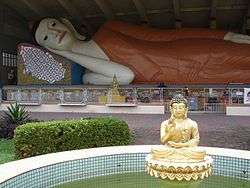
A Chinese population known as the Hui people practised Islam yet retained Chinese culture and have unique traditions. Communities existed in Singapore, Pangkor Island, and Sitiawan before the Second World War. The last established community, in Penang, was dispersed when they were evicted from their homes due to development projects.[43]
In 2013, a video of a group of Buddhist practitioner from Singapore conducting religious ceremonies in a surau had become viral on Facebook. Malaysian police have arrested a resort owner after he allowed 13 Buddhists to use a Muslim prayer room(surau) for their meditation at Kota Tinggi, Johor.[44] The incident has been a frown upon Muslims in Malaysia. It has also become a hot topic in the social media. Following up at 28 August 2013, the controversial prayer room was demolished by the resort management within 21 days from the date of receipt of the notice after much protests by the residents of Kota Tinggi.[45][46] At the time, Syed Ahmad Salim, the resort owner explained that he had allowed the group of Buddhists to use the surau for a meditation session as he was unaware that it was an offence. [47]
Hinduism

The majority of the Tamils who make up 9% of Malaysia's population practice Hinduism. Hinduism was influential prior to Islam, but current adherents are mostly descended from migrant communities from Tamil Nadu who came to Malaya to work on British rubber plantations. A small community of migrants from North India also exists.[8]
Urban temples are often dedicated to a single deity, while rural temples are often home to many different deities. Most were brought with immigrants. Most temples follow the Saivite tradition from Southern India, for the worship of Siva. The Hindu holiday of Thaipusam and Deepavali is a national holiday.[8] Practice of the Hindu religion is strongly linked with the cultural identity of Malaysian Indians. Those who convert to another religion may be ostracised by their family and the Indian community.[48]
There is growing anger in the Hindu community over what they believe is a government-backed drive to demolish Hindu temples under the guise that they are illegal structures.[32] The Hindu Rights Action Force, a coalition of 50 Hindu-based NGOs, has accused the government of an unofficial policy of "temple cleansing", with much of the demolition focused around the capital city, Kuala Lumpur.[49] An Indian minister in the cabinet even threatened to boycott Deepavali in response to these demolitions.[32]
Christianity
About 10% of the population of Malaysia are Christians, mostly non-Malay Bumiputera, also including some Malaysian Chinese and Malaysian Indian minorities. The most common denominations are Anglican, Methodist, and Roman Catholic. Most Christians are found in East Malaysia, where Good Friday is a public holiday in the states of Sabah and Sarawak. Christmas is a national holiday, although Easter is not.[8]
Traders with links to Christianity from the Middle East arrived in what is now Malaysia in the 7th century. Catholicism was brought by the Portuguese in the 15th century, followed by Protestantism with the Dutch in 1641. As Portuguese influence declined Protestantism began to eclipse Catholicism. Christianity spread further through missionaries who arrived during British rule in the 19th century and introduced Christianity to East Malaysia.[50] Initial conversions focused mainly on the Straits Settlements. When missionaries began to spread through the peninsula, they were discouraged from converting Malays, focusing on Chinese and Indian immigrants.[16]
Christianity has become restricted as Malaysia has become more Islamic. Restrictions have been placed on the construction of new churches, although existing ones are allowed to operate. The city of Shah Alam has not allowed any churches to be built. Christians are not allowed to attempt the conversion of Muslims and their literature must have a note saying it is for non-Muslims only. Similarly, the film The Passion of the Christ was restricted only to Christian viewers.[8] In April 2005 two Christians were arrested for distributing Christian material in front of a mosque, although charges were later dropped. The restrictions of the dissemination of Malay-language Christian material is much less strict in East Malaysia than in the west. Good Friday is also an official holiday in East Malaysia, although not a national one.[7]
The use of the Malay word "Allah" for God has caused a dispute in Malaysia, with Malay language Bibles banned due to the use of this word.[8] It was argued that as the Bibles could be used to spread religions other than Islam, they were against the constitution. Other ministers opposed this discrimination. In 2005 Mohamed Nazri Abdul Aziz tried to enforce this, although some of his ministers argued the national language could be used for any purpose.[51] The Bible in the indigenous Iban language was allowed, as that language has no alternate word besides "Allah" for God.[8]
Other

A small Sikh community exists in Malaysia, brought by the British to form police units. They follow Sikhism, and open their places of worship to all races ages and genders. No Sikh holiday has been declared a national holiday,[8] although there are 120,000 in the country. Sikhs have, like Christians, come under pressure not to use the word "Allah" for God in their religious texts.[52]
A small Jewish community existed on the island of Penang. Jews first came into contact with the Malay peninsula during the 11th century when Jewish traders traded with the Kedah Sultanate and Langkasuka. Many Jews in Malaysia came from Persia. After the communist revolution in China, more Jews fled to Southeast Asia. However, the Jewish community declined, with many emigrating to countries such as Australia. Due to not having enough members to hold some Jewish rituals, the only synagogue in Penang, established in 1932, was shut down in 1976. The last burial in Penang's Jewish cemetery took pace in 1978.[53] By the 1990s the community had disappeared, and it is now thought that there are only two Jews who hold Malaysian passports.[54]
A small Baha'i group exists in Malaysia, with members from Chinese, Eurasian, Indian, Indigenous communities. It was introduced to Malaya by an Iranian couple in 1950, with the first National Spiritual Assembly being elected in 1964.[55] A community of around 2500 Jains lives in Malaysia, with the state of Ipoh hosting the only Jain temple in Southeast Asia. Most are Gujaratis, who are thought to have arrived in Malacca in the 15th or 16th century.[56]
Traditional beliefs are still practised by the Orang Asal people. Loosely classified as animism, the beliefs are not recognised by the state as a religion. Animistic beliefs are passed down through oral tradition due to the lack of a writing system in indigenous groups, who call their beliefs agama adat (traditional or customary religions). The different religions are rather varied, with different names and concepts for their supreme god and other supernatural deities. Most of the beliefs are heavily influenced by the environment, with physical features such as mountains, trees, valleys, and rivers being sacred. A close relationship with nature is nurtured, and the relationship of humans and nature is a strong part of the religion, with everyday activities such as hunting and gathering having spiritual significance.[57]
References
- ↑ https://www.statistics.gov.my/index.php?r=column/cthemeByCat&cat=117&bul_id=MDMxdHZjWTk1SjFzTzNkRXYzcVZjdz09&menu_id=L0pheU43NWJwRWVSZklWdzQ4TlhUUT09
- ↑ Robert Evans (December 9, 2013). "Atheists face death in 13 countries, global discrimination: study". Reuters.
- 1 2
- 1 2 Wu & Hickling, p. 35.
- 1 2 3 4 "Religion". Tourism Malaysia. Retrieved 15 July 2011.
- 1 2 3 "Taburan Penduduk dan Ciri-ciri Asas Demografi" (PDF). Jabatan Perangkaan Malaysia. p. 82. Retrieved 25 March 2013.
- 1 2 3 4 5 6 7 8 9 10 11 12 13 14 15 16 17 18 19 20 21 "Malaysia". United States Department of State. Retrieved 15 July 2011.
- 1 2 3 4 5 6 7 8 9 10 11 12 13 14 15 16 17 18 19 20 "Malaysia - Religion". Michigan State University. Retrieved 13 July 2011.
- 1 2 Pressly, Linda (15 November 2006). "Life as a secret Christian convert". BBC. Retrieved 16 July 2011.
- ↑ Virginia Matheson Hooker, Norani Othman (2003). Malaysia: Islam, society and politics. Singapore: Institute of Southeast Asian Studies. p. 57. ISBN 981-230-161-5.
- ↑ Tarani Palani (1 July 2011). "Religious council throws its weight behind all three rallies". Retrieved 25 July 2011.
- 1 2 3 "Pressure on multi-faith Malaysia". BBC. 16 May 2011. Retrieved 15 July 2011.
- ↑ Lee, Raymod (April 1988), "Patterns of Religious Tension in Malaysia", Asian Survey, 28 (4): 400–418, doi:10.1525/as.1988.28.4.01p0154q, JSTOR 2644735
- 1 2 3 Westerlund, David (1996). Questioning the secular state: the worldwide resurgence of religion in politics (4, illustrated ed.). C. Hurst & Co. Publishers. pp. 365, 380–381. ISBN 1-85065-241-4.
- 1 2 Perlez, Jane (24 August 2006). "Once Muslim, Now Christian and Caught in the Courts". New York Times. Retrieved 16 July 2011.
- 1 2 3 4 Raymond L. M. Lee, Susan Ellen Ackerman (1997). Sacred tensions: modernity and religious transformation in Malaysia (Illustrated ed.). University of South Carolina Press. pp. 17, 21, 24–25. ISBN 1-57003-167-3.
- 1 2 3 4 Imran Imtiaz Shah Yacob (27 April 2007). "Doing the Impossible: Quitting Islam in Malaysia". Asia Sentinel. Retrieved 16 July 2011.
- ↑ Fuller, Thomas (28 August 2006). "Malaysia's secular vision vs. 'writing on the wall'". New York Times. Retrieved 17 July 2011.
- ↑ Louay M. Safi (2000). "Religion and Politics in Malaysia". Retrieved 17 July 2011.
- 1 2 3 Gan Ping Sieu (17 March 2009). "MCA: Malaysia is a secular state". The Nut Graph. Retrieved 25 July 2011.
- ↑ Martinez, Patricia A (2001). "The Islamic State or the State of Islam in Malaysia". Contemporary Southeast Asia. 23. Retrieved 17 July 2011.
- 1 2 "Malaysia: Prime Minister declares, "Yes, we ARE an Islamic state"". Malaysiakini. 27 August 2007. Retrieved 25 July 2011.
- 1 2 Abdullah Saeed, Hassan Saeed (2004). Freedom of religion, apostasy and Islam (illustrated ed.). Ashgate Publishing, Ltd. pp. 3, 124, 126, 132. ISBN 0-7546-3083-8.
- ↑ "Marriage Procedures Between Muslim and Non-Muslim". Malaysian Government. Retrieved 16 July 2011.
- ↑ Kent, Jonathan (6 July 2007). "Malaysia 'convert' claims cruelty". BBC. Retrieved 16 July 2011.
- ↑ http://www.freemalaysiatoday.com/category/nation/2013/07/23/students-forced-to-take-meals-in-toilet-area/?utm_source=feedburner&utm_medium=feed&utm_campaign=Feed%3A+mycenews+(MyCen+News) http://internethindu.org/2016/06/12/non-muslim-students-forced-to-eat-their-lunches-in-bathroom-during-ramadan/ http://www.asianews.it/news-en/Non-Muslim-pupils-forced-to-eat-in-bathroom-because-of-Ramadan-28561.html http://www.themalaymailonline.com/malaysia/article/on-facebook-students-shown-eating-in-school-toilet http://www.funnymalaysia.net/non-muslim-students-force-to-eat-in-toilet-to-respect-their-muslim-counterparts-who-is-fasting-before-commenting-please-do-not-comment-any-racial-stuff/ http://www.scmp.com/news/asia/article/1289372/fury-malaysian-schools-canteen-toilet http://www.theblaze.com/stories/2013/07/24/deeply-concerned-malaysian-students-allegedly-forced-to-eat-in-the-bathroom-during-ramadan/ http://www.liveleak.com/view?i=fc5_1374672443#XAfCXFFvi41iHs5F.99 http://www.hindujagruti.org/news/16882_non-muslim-school-children-forced-to-eat-in-bathroom.html
- ↑ https://web.archive.org/web/20140129091424/http://www.examiner. com/article/9-malaysian-churches-burned-dispute-over-allah http://www.telegraph.co.uk/news/worldnews/asia/malaysia/6963436/Religious-violence-in-Malaysia-escalates-as-more-churches-attacked.html https://web.archive.org/web/20100111053152/http://www.france24.com/en/20100108-malaysia-church-fire-bombed-ahead-protests http://news.bbc.co.uk/2/hi/8447450.stm http://www.asianews.it/news-en/New-attack-against-Christians-in-Malaysia:-the-ninth-in-four-days-17307.html http://www.asianews.it/news-en/Malaysia:-Four-Christian-churches-attacked-over-controversy-on-the-use-of-Allah-17291.html https://web.archive.org/web/20100111000417/https://www.google.com/hostednews/afp/article/ALeqM5iXTElj3miGieEBuBdQ1alAqX3jWA https://www.google.com/hostednews/afp/article/ALeqM5iXTElj3miGieEBuBdQ1alAqX3jWA http://www.reuters.com/article/slideshow/idUSTRE6080MV20100109#a=2 http://www.reuters.com/article/us-malaysia-religion-idUSTRE6080MV20100109 http://www.reuters.com/article/slideshow/idUSTRE6080MV20100109#a=1 http://www.wsj.com/articles/SB126311168353723519 http://news.bbc.co.uk/2/hi/asia-pacific/8450713.stm http://www.penang-traveltips.com/asia/malaysia/perak/taiping/all-saints-church.htm http://news.bbc.co.uk/2/hi/8447450.stm http://news.bbc.co.uk/2/hi/asia-pacific/7163391.stm http://www.asianews.it/news-en/Malaysian-government-defeated-by-history:-Christians-have-used-the-word-Allah-for-centuries-14574.html https://www.youtube.com/watch?v=hQrMFlU31rc https://www.youtube.com/watch?v=pRLHc2iFpck https://www.youtube.com/watch?v=4fu-WHLl_VU https://www.youtube.com/watch?v=KT9SJbtcCeQ https://www.youtube.com/watch?v=CrbTOtiFChk https://www.youtube.com/watch?v=8iErgylAmn8 https://www.youtube.com/watch?v=z1CgfuG93qk https://www.youtube.com/watch?v=HjiyDLOg4-Q https://www.youtube.com/watch?v=zPn31Ala_2Y http://www.france24.com/en/20100108-malaysia-church-fire-bombed-ahead-protests https://www.youtube.com/watch?v=MQtwdsyPZO0 https://www.youtube.com/watch?v=MQtwdsyPZO0
- ↑ http://www.fides.org/en/news/37690-ASIA_MALAYSIA_Forced_removal_of_a_cross_the_government_orders_an_investigation#.V7zEivkrKWg http://www.fides.org/en/news/37690-ASIA_MALAYSIA_Forced_removal_of_a_cross_the_government_orders_an_investigation#.VWTNYVLfSzl http://www.fides.org/en/news/37690-ASIA_MALAYSIA_Forced_removal_of_a_cross_the_government_orders_an_investigatio http://www.themalaymailonline.com/malaysia/article/pointless-to-punish-cross-protesters-for-their-ignorance-sabah-churches-say
- ↑ https://www.youtube.com/watch?v=sRu1Pjnuujs https://www.youtube.com/watch?v=sRu1Pjnuujs https://www.youtube.com/watch?v=LBXew3DEAZM&feature=related https://www.youtube.com/watch?v=ciQ8P3heHbA&feature=related https://www.youtube.com/watch?v=NsGwwSujWBw&feature=related http://www.ipsnews.net/login.asp?redir=news.asp?idnews=33451 https://web.archive.org/web/20060719033100/http://www.ipsnews.net/login.asp?redir=news.asp%3Fidnews=33451 http://www.ipsnews.net/2006/06/malaysia-temple-demolitions-spell-creeping-islamisation/ http://www.reuters.com/article/idUSKLR19714220070709 http://www.reuters.com/article/us-malaysia-religion-idUSKLR19714220070709 http://in.reuters.com/article/idINIndia-30397720071108?pageNumber=1
- ↑ Anthony Spaeth (9 December 1996). "Bound for Glory". Time magazine. Archived from the original on 17 March 2009. Retrieved 13 September 2011.
- ↑ "Malaysian leader tells church group regime is secular". Taipei Times. 4 August 2004. Retrieved 25 July 2011.
- 1 2 3 Jalil Hamid (8 November 2007). "Malaysia ethnic Indians in uphill fight on religion". Reuters. Retrieved 15 July 2011.
- ↑ Barbara Watson Andaya, Leonard Y. Andaya (1984). A History of Malaysia. Basingstoke, Hampshire, UK: MacMillan Press Ltd. pp. 52–53. ISBN 0-333-27672-8.
- ↑ Kent, Jonathan (3 March 2005). "Chinese diaspora: Malaysia". BBC. Retrieved 17 July 2011.
- ↑ "Malaysia". United States Department of State. 28 January 2011. Retrieved 17 July 2011.
- ↑ Department of Islamic Development Malaysia, Government of Malaysia. "Ajaran Bahai (Bahai Doctrine)". http://www.e-fatwa.gov.my. Department of Islamic Development Malaysia. Retrieved 4 December 2014. External link in
|website=(help) - ↑ Constitution of Malaysia:Article 160 (2)-1
- ↑ Jennifer Pak (4 January 2010). "Unmarried couples caught in Malaysia hotel raids". BBC News. Retrieved 15 January 2011.
- ↑ Peletz, Michael (2002). Islamic modern: religious courts and cultural politics in Malaysia. Princeton: Princeton University Press. pp. 84–85. ISBN 0-691-09508-6.
- ↑ Mahathir, Marina (17 August 2010). "Malaysia moving forward in matters of Islam and women by Marina Mahathir - Common Ground News Service". Commongroundnews.org. Retrieved 14 September 2010.
- ↑ Tan, Chee-Beng (1983). "Chinese Religion in Malaysia: A General View". Asian Folklore Studies. 42: 217. JSTOR 1178483.
- ↑ Benny Liow Woon Khin; Ong Seng Hua. "Buddhism and Chinese Religions". The Encyclopaedia of Malaysia. Retrieved 16 July 2011.
- ↑ Bhatt, Himanshu (27 October 2011). "The lost Muslims from China". The Sun Daily. Retrieved 23 November 2011.
- ↑ "https://www.youtube.com/watch?v=waSBtJ1_mdk". The Star Online. August 14, 2013. Retrieved August 14, 2013. External link in
|title=(help) - ↑ "Surau in Kota Tinggi resort demolished". The Star Online. August 28, 2013. Retrieved August 28, 2013.
- ↑ "Surau kontroversi diroboh(Malay)". Kosmo!. August 28, 2013. Retrieved August 28, 2013.
- ↑ "One year after surau controversy, normalcy returns to Johor resort". Kosmo!. 23 October 2014. Retrieved 23 October 2014.
- ↑ Gill, Savinder Kaur; Gopal, Nirmala Devi (2010), "Understanding Indian Religious Practice in Malaysia" (PDF), Journal of Social Science, 25 (3): 135–146
- ↑ "Hindu group protests 'temple cleansing' in Malaysia". Financial Express. 23 May 2006. Retrieved 15 July 2011.
- ↑ Hermen Shastri. "History of Christianity in Malaysia". Encyclopaedia of Malaysia. Retrieved 15 July 2011.
- ↑ "No Bible in local languages". AsiaNews. 26 April 2005. Retrieved 15 July 2011.
- ↑ Parry, Richard Lloyd (13 January 2010). "Stones thrown at Malaysian Sikh temple following religious row". The Sunday Times. Retrieved 17 July 2011.
- ↑ Himanshu Bhatt. "The Jews of Penang". Penang Story. Retrieved 15 July 2011.
- ↑ Harris, Andrew (17 July 2009). "Life in Jewish Malaysia". Retrieved 15 July 2011.
- ↑ "Malaysian Baha'i Community". National Spiritual Assembly of the Baha'is of Malaysia. Retrieved 15 July 2011.
- ↑ "Malaysia". Jain Heritage Centres. Retrieved 18 September 2011.
- ↑ Ghazali bin Basri. "Indigenous Beliefs". Encyclopaedia of Malaysia. Retrieved 17 July 2011.
Further reading
- Lee, Raymond L. M.; Ackerman, Susan Ellen (1997). Sacred Tensions: Modernity and Religious Transformation in Malaysia. University of South Carolina Press. ISBN 978-1-57003-167-0.



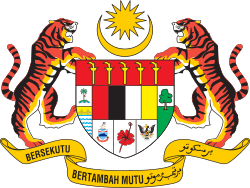
.jpg)
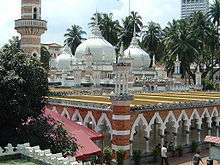
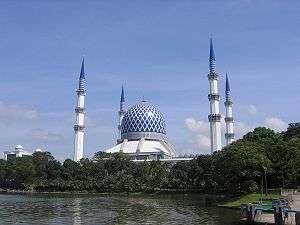
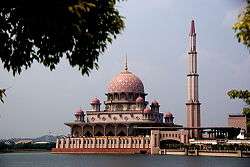

%2C_Sentul%2C_Kuala_Lumpur.jpg)

